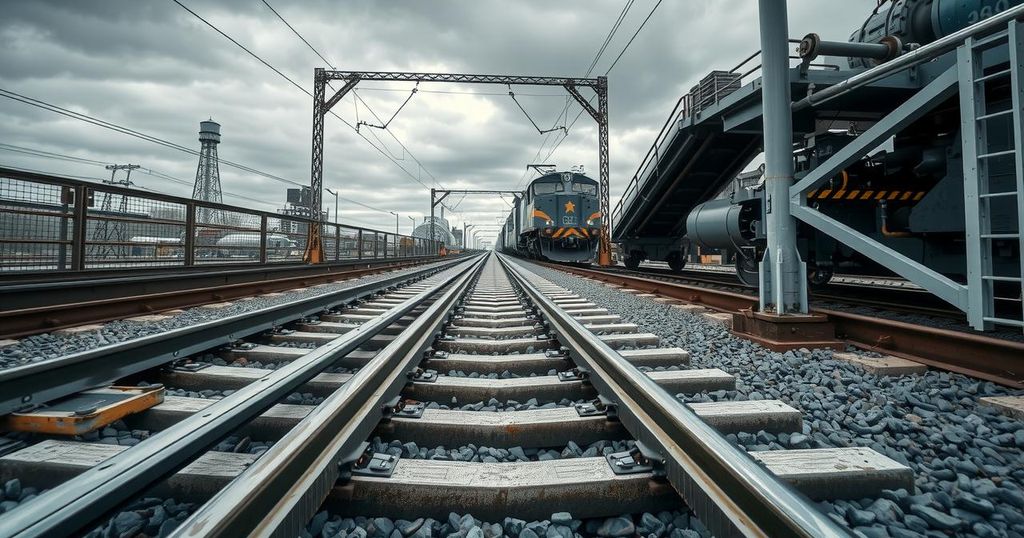ArcelorMittal’s Legal Threats Amid Liberia’s Multiuser Rail Strategy
ArcelorMittal Liberia threatens legal action against the Government of Liberia concerning a proposed agreement allowing Ivanhoe Atlantic multiuser access to the Yekepa-Buchanan railway. The GOL aims to terminate AML’s monopoly, with support from legal opinions reinforcing its authority. The dispute underscores Liberia’s economic strategies and efforts to increase competition and investment in the railway sector.
The conflict regarding Liberia’s railway infrastructure has escalated, with ArcelorMittal Liberia (AML) cautioning the Government of Liberia (GOL) about potential legal proceedings if it finalizes an agreement that permits Ivanhoe Atlantic access to the Yekepa-Buchanan railway. In a communication to Liberia’s Inter-Ministerial Concessions Committee, AML’s CEO, Michiel van der Merwe, contended that this plan contradicts AML’s existing Mineral Development Agreement (MDA).
As Liberia progresses toward implementing Executive Order 136, which aims to establish a multiuser rail operator regime, the GOL’s intention to diversify access to the railway poses a significant challenge to AML’s monopoly. The government aims to facilitate multiple mining companies, including Ivanhoe Atlantic, in evacuating iron ore, which could generate substantial revenue for Liberia.
AML vehemently opposes the proposed negotiations, asserting that they infringe upon its legal rights under the MDA. The company expresses concern over the allocation of rail capacity to Ivanhoe Atlantic, which they argue undermines their operational capabilities and violates established procedures. AML claims this contract grants Ivanhoe the ability to construct additional rail infrastructure, further infringing upon AML’s purported rights.
Moreover, AML argues that the government’s plan to transition to an independent rail operator by 2030 would terminate its established rights to operate the railway. With an investment exceeding $3 billion, AML fears that relinquishing control could jeopardize its financial interests and long-term objectives. The company additionally criticizes the government for allowing Ivanhoe access to port facilities in Buchanan, citing violations of their existing agreements.
AML’s communication indicates that if the GOL proceeds with the agreement, it will consider this a breach of the MDA, pursuing all legal avenues available, including international arbitration. A GOL insider expressed confidence in the government’s sovereignty, emphasizing its right to leverage national assets for economic benefit. In this context, AML’s historical reliance on arbitration and litigation could lead to prolonged legal disputes.
The GOL, however, remains resolute in implementing a multiuser rail system, with Minister of Mines and Energy, Wilmot Paye, affirming the government’s commitment to this strategy. A legal opinion from former Minister of Justice, Cllr. Frank Musah Dean, supports the government’s position, disputing AML’s claims and reinforcing that existing agreements allow for multiuser access. The Justice Ministry clarified that the GOL maintains sovereignty over its infrastructure and that AML’s rights are not absolute.
Furthermore, the National Legislature’s rejection of AML’s MDA renewal in 2022, based on public consultations, indicates a shift in governmental perspectives. Liberia’s move towards a multiuser rail system as a national economic strategy aims to leverage the Yekepa-Buchanan railway, which has been under AML’s control since 2005. Independent experts believe this shift could unlock Liberia’s economic potential by allowing logistical utilization of untouched iron ore deposits and enhancing competition.
The GOL is actively pursuing the implementation of a multiuser rail system, outlining steps for the transition, such as finalizing national rail standards and selecting an independent rail operator. Ivanhoe Atlantic has indicated its readiness to commence operations, signaling an important commitment to the GOL’s plans.
The distinct legal and financial dynamics at play place AML at a critical juncture as it must decide whether to preserve its monopoly or adapt to the evolving landscape. Public sentiment appears to favor the government’s stance on multiuser rail access, emphasizing the need for progression in Liberia’s economic framework.
The government’s position, shaped by legal and economic foundations, stands firm against AML’s legal threats. Observers question AML’s potential arbitration actions, given recorded defaults on their MDA. The ensuing days are crucial in determining whether AML will adjust its strategies in alignment with the GOL’s policies or intensify its legal confrontations, amid ongoing negotiations with Ivanhoe Atlantic.
In summary, the ongoing dispute between ArcelorMittal Liberia and the Government of Liberia centers on the proposed multiuser access to the Yekepa-Buchanan railway. AML’s legal threats highlight its resistance to GOL’s plans to diversify rail usage, while the government’s commitment to a multiuser system reflects a strategic shift aimed at economic growth. Legal opinions support the GOL’s authority in negotiating third-party access, indicating a significant evolution in Liberia’s railway policy. The outcome of this conflict will likely impact the national economic landscape as the government strives to maximize its infrastructure assets.
Original Source: www.liberianobserver.com




Post Comment